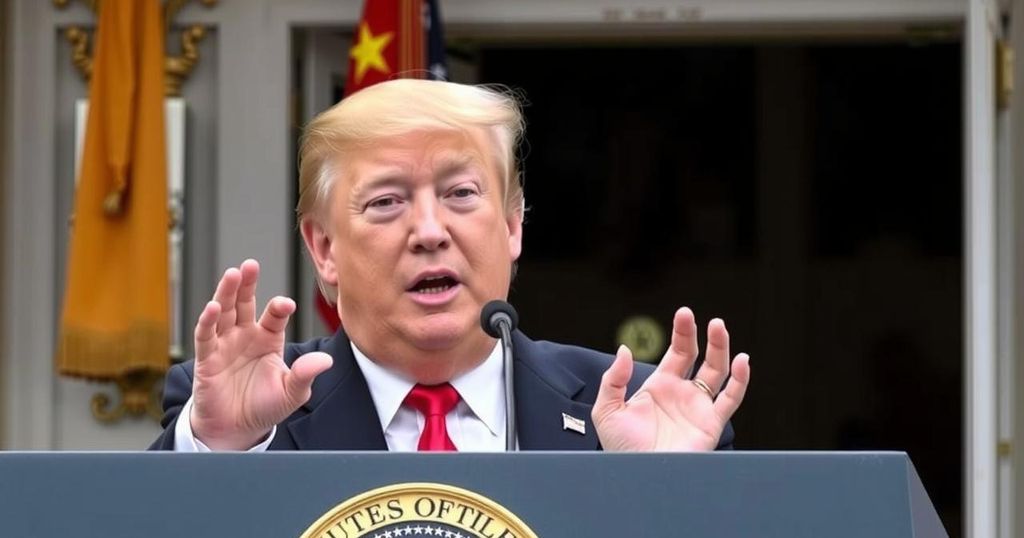Global news
ASIA, BBC, BEIJING, BIDEN ADMINISTRATION, CBS, CBS NEWS, CHINA, CHINESE COMMUNIST PARTY, COMMUNIST PARTY, EMMANUEL MACRON, EUROPE, FOREIGN POLICY, FOX NEWS, FRANCE, INTERNATIONAL RELATIONS, JAVIER MILEI, MIDDLE EAST, NATIONAL SECURITY, PARIS, US STATE DEPARTMENT, US-CHINA RELATIONS, WALTZ, WASHINGTON DC, WHITE HOUSE, XI
Jamal Walker
0 Comments
Xi Jinping Unlikely to Attend Trump Inauguration Despite Invitation
Chinese President Xi Jinping is not expected to attend Donald Trump’s inauguration in January, despite an invitation. Historically, no foreign leaders have attended U.S. inaugurations, and this invitation reflects a desire for open diplomatic relations. However, ongoing tensions, particularly regarding trade and cybersecurity issues with China, complicate these interactions.
Chinese President Xi Jinping is not expected to attend the inauguration of President-elect Donald Trump in January, despite having received an invitation. Sources familiar with the situation have indicated that China’s ambassador to the United States will likely attend, along with other officials from Beijing. Historically, no foreign leaders have attended a U.S. presidential inauguration, which makes this situation particularly unique.
The invitation has been interpreted as part of Trump’s strategy to foster dialogue with leaders of both allied and adversarial nations. Trump’s spokeswoman, Karoline Leavitt, emphasized the significance of this approach, stating that it reflects the president’s openness to engaging with various world leaders. Despite occasional praises for President Xi, Trump has also been critical of China’s trade practices, pledging to impose increased tariffs on its goods upon taking office.
The geopolitical context remains tense, with Trump’s cabinet picks expressing critical views towards China. Notably, Secretary of State nominee Marco Rubio has been sanctioned by the Chinese government, and national security adviser Mike Waltz has emphasized the need for the U.S. to focus on countering the Chinese Communist Party’s influence. Furthermore, U.S. intelligence agencies have recently reported a data breach linked to Chinese hackers, affecting several major telecommunications companies.
As the inauguration approaches on January 20, other foreign leaders have also received invitations. However, history indicates that this inauguration will remain an event largely attended by American officials and diplomats, consistent with the traditions observed since 1874.
While diplomatic presence is expected, the absence of Xi Jinping underscores the complex and multifaceted nature of U.S.-China relations underpinning the current political landscape. The invitation to foreign leaders, including Xi, may represent an effort by the Trump administration to redefine diplomatic engagement during its tenure.
The invitation extended to foreign leaders for attending a presidential inauguration is unprecedented in U.S. history. Since 1874, no foreign dignitaries have participated in such a ceremony, highlighting the weight of Trump’s initiative to invite figures like Xi Jinping. The relationship between the U.S. and China has traditionally been fraught with complexities, especially in light of trade disputes and concerns regarding cybersecurity. Furthermore, Trump’s approach of inviting rivals and competitors suggests a new diplomatic posture, aiming to recalibrate engagements within the international community.
In summary, despite an invitation, it is unlikely that Chinese President Xi Jinping will attend the inauguration of Donald Trump, with historical precedents suggesting a continuing absence of foreign leaders at this event. The situation reflects broader geopolitical tensions between the U.S. and China, punctuated by Trump’s critical stance on trade and cybersecurity issues. Simultaneously, the invitation marks an effort to create an open dialogue with various international leaders, representing a significant shift in diplomatic interactions.
Original Source: www.bbc.com




Post Comment